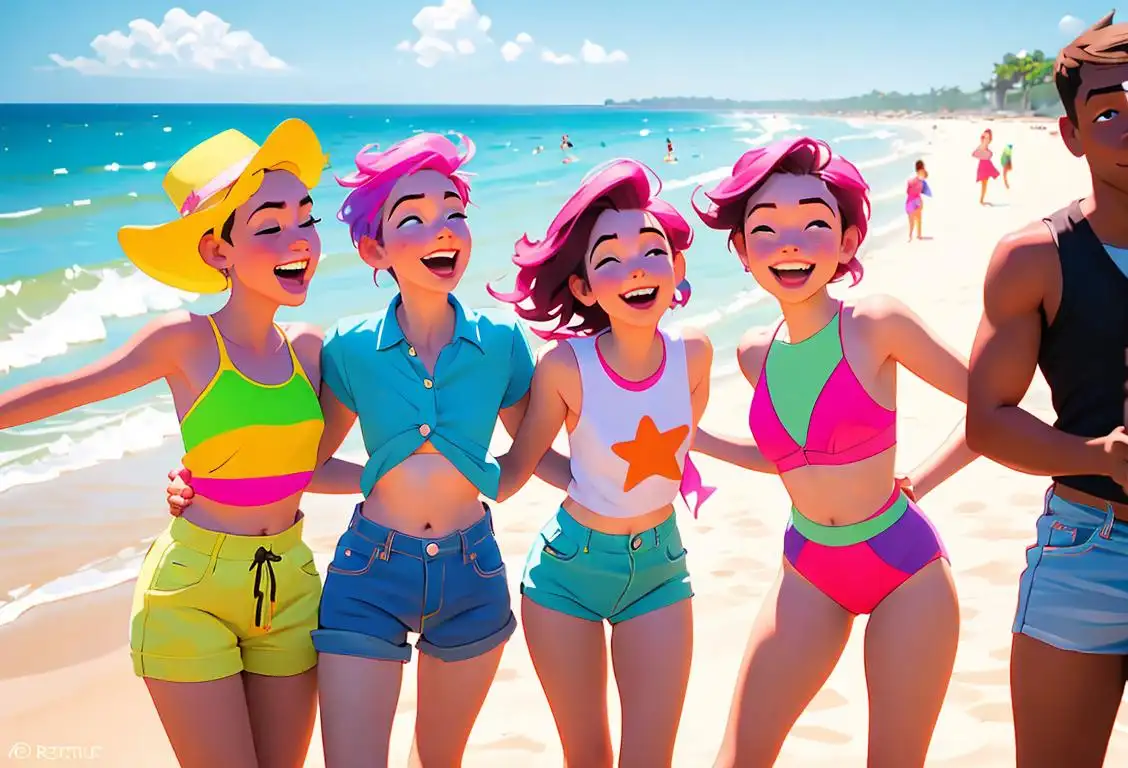National Get Naked Day

Welcome to the wild and wacky world of National Get Naked Day! Get ready to shed your inhibitions and embrace your birthday suit. We've got all the juicy details on the internet and actual history of this undeniably cheeky celebration. Get ready to giggle and learn as we bare it all!
When is Get Naked Day?
It's national get naked day on the 15th April.
The Origins of National Get Naked Day
Oh, National Get Naked Day, you sly devil! This risqué holiday has captured the attention of internet enthusiasts around the world. So, where did it all begin? Well, we couldn't find much in terms of *actual* historical significance, but it seems that the internet has adopted this day as a light-hearted way to let loose and embrace body positivity. It's a day to throw caution to the wind (and your clothes on the floor) and celebrate the skin we're in.
An Internet Phenomenon
National Get Naked Day first started gaining traction online around April 15, 2015. It quickly spread like wildfire, with people from all walks of life sharing their experiences and opinions. From hilarious memes to heartfelt stories, the internet exploded with joyful and cheeky celebrations of self-acceptance.
Spreading the Love (and Laughs)
While some may view National Get Naked Day as just another excuse to get frisky, it's important to remember the underlying message of this hilarious holiday: body positivity. It's a reminder that our bodies, in all their shapes and sizes, are something to be celebrated, not hidden.
Getting Involved
If you're feeling up for the challenge (and the potential embarrassment), there are a few ways you can get involved in National Get Naked Day. Just remember to respect yourself and others, and always make sure you're in a safe and consenting environment. Whether you want to organize a nudist beach meetup, host a body painting party, or simply spend the day in your birthday suit at home, the choice is yours!
Did You Know?
Did you know that the Guinness World Record for the largest skinny dip was set on July 9, 2018, in Ireland? A total of 2,505 people took the plunge and stripped down to their birthday suits, all for a good cause! Not only did they break the record, but they also raised funds for a local cancer support organization. Talk about an epic way to celebrate body positivity!
History behind the term 'Get Naked'
1700s
First known usage
The term 'get naked' originated in the 1700s when it was first used colloquially to describe the act of removing one's clothing. At this time, nudity was often associated with innocence and natural beauty, and the phrase reflected a more carefree and relaxed attitude towards the human body.
Ancient Times
The Birth of Nudity
Nudity has been a part of human existence since the beginning. In ancient times, especially in certain cultures such as ancient Greece, nudity was considered a natural state. It symbolized purity, freedom, and a connection to the divine. Nudity was often celebrated in various forms of art and physical activities, such as sports and bathing.
1933
Origin of the phrase
The term 'get naked' originated in the year 1933. It is derived from the combination of two words, 'get' and 'naked'. 'Get' is an English verb meaning to obtain or acquire something, while 'naked' refers to being without clothing or in a state of undress. Together, these words create a phrase that suggests removing one's clothes.
1550
The first documented use
The term 'get naked' can be traced back to the year 1550, where it was first documented in English texts. At this time, it was commonly used to indicate the act of removing one's clothing or being without clothing. However, it was mostly a functional term without any specific cultural connotations.
1953
The Birth of 'Get Naked'
The term 'get naked' first emerged in 1953, primarily in reference to a literal action of removing one's clothing. During this time, it was often associated with activities such as skinny dipping or taking a bath. The phrase served as a straightforward invitation to shed one's garments and embrace a state of undress.
1769
The Birth of 'Naked'
In the year 1769, the word 'naked' was first recorded in the English language. It comes from the Old English word 'nacod', which can be traced back to the Proto-Germanic word 'nakwadaz'. 'Naked' means being unclothed or without covering, and it has been used to describe the state of being bare or exposed ever since.
1700s
The origins of nudity in art
During the 1700s, nudity began to gain acceptance in the art world as a means of expressing beauty and vulnerability. Paintings and sculptures featured nude figures, and this artistic trend paved the way for a shift in societal attitudes toward nudity.
1800
The Origin of 'Get Naked'
The term 'get naked' originated in the late 18th century during the Romantic era. It was a time when people sought a deeper connection with nature and embraced a freer lifestyle. The concept of nudity was associated with a return to a more natural state, both physically and spiritually. As a result, the phrase 'get naked' began to be used figuratively, expressing the desire to strip away societal constraints and embrace authenticity.
1727
Origin of the term 'naked'
The term 'naked' originated in 1727 from the Old English word 'nacod', which meant 'naked' or 'bare'. This term evolved over time and became commonly used to describe the state of being unclothed.
1771
Introduction of the term 'get naked'
The phrase 'get naked' came into existence in 1771. It was derived from the combination of the word 'get', meaning 'to obtain or acquire', and the term 'naked'. It was initially used in a literal sense, encouraging someone to physically remove their clothing.
1920s
The rise of the swimsuit culture
In the 1920s, the swimsuit culture emerged as a prominent aspect of beach fashion. Women started to wear swimsuits that revealed more skin, challenging traditional modesty standards. The phrase 'get naked' began to be associated with shedding the societal expectations of covering up and embracing a more liberated attitude towards the human body.
1970
Cultural Shift and Liberation
In the 1970s, the term 'get naked' began to take on a broader cultural significance. It became associated with the idea of personal liberation and the rejection of societal norms. The phrase was embraced by countercultural movements, and many advocates used it as a symbol of freedom, self-expression, and breaking free from conventions.
1920
The Roaring Twenties and Sexual Liberation
In the 1920s, known as the Roaring Twenties, there was a significant cultural shift towards sexual liberation and breaking traditional social norms. This period marked the rise of the flapper culture, with women challenging Victorian ideals of modesty through their clothing choices and behavior. The phrase 'get naked' found a place within this atmosphere of liberation, symbolizing a rejection of prudishness and an embrace of personal freedom.
1920s
Expression gains popularity
During the 1920s, the term 'get naked' gained more prominence in popular culture, particularly in relation to the rapidly changing social attitudes towards sexuality and body image. The Roaring Twenties saw a rise in the acceptance of nudity as a form of self-expression and liberation, especially within artistic circles.
1920
Evolution into a casual phrase
In the 1920s, 'get naked' started to evolve from a functional term to a more casual phrase. This change coincided with the liberation and more relaxed social attitudes of the time. The phrase began to be used metaphorically to suggest letting go of inhibitions and being open or vulnerable. It represented a shift towards a more liberated and carefree attitude towards one's body and personal expression.
1900s
Nudism Emerges
During the early 1900s, a movement called nudism, also known as naturism, gained popularity. Nudism advocates believed that being naked in naturist settings was a way to connect with nature and promote body acceptance. Nudist clubs and beaches began to appear around the world, providing safe spaces for people to get naked and embrace the freedom of being without clothes.
1960s
Counterculture movement
During the 1960s, the counterculture movement emerged, challenging societal norms and traditional values. This era embraced freedom of expression and often promoted the idea of shedding inhibitions. The phrase 'get naked' gained popularity within this cultural context, symbolizing a rejection of established boundaries and a celebration of personal liberation.
Middle Ages
Influence of Religion
During the Middle Ages, the rise of religious institutions brought significant changes in societal attitudes towards nudity. Many religious doctrines viewed the human body as inherently sinful and indecent. Nudity became associated with shame and immorality, leading to strict cultural norms that covered the body. The influence of religion during this period restricted public display of nudity and set the stage for modesty to dominate for centuries to come.
1950s
Shift towards a figurative meaning
During the 1950s, the phrase 'get naked' began to take on a figurative meaning beyond its literal interpretation. It started to be used metaphorically to represent vulnerability, openness, and authenticity. This shift in meaning expanded the phrase's usage to contexts beyond physical nudity.
1960s
Nudist movement and body positivity
In the 1960s, the nudist movement began to gain traction, promoting a more natural and accepting approach to nudity. The term 'get naked' became closely associated with this movement, as individuals embraced their bodies and sought to challenge societal taboos surrounding nudity. This era also witnessed the rise of body positivity movements, further fueling the cultural acceptance of the phrase.
18th and 19th centuries
The Rise of Naturism
The movement known as naturism, or nudism, emerged during the 18th and 19th centuries as a reaction against the repressive social norms imposed by religious and Victorian values. Naturists sought a return to the body's natural state, embracing nudity as a way to promote body acceptance, freedom, and a closer connection with nature. Advocates of naturism aimed to challenge society's view on nudity and promote non-sexual social nudity.
1970s
Nudist culture
In the 1970s, there was an increased interest in the nudist lifestyle and the development of nudist communities. The term 'get naked' became associated with the philosophy and activities of these communities, which emphasized the acceptance of nudity as a natural state. 'Get naked' took on a more literal meaning within this cultural niche, encouraging people to disrobe and embrace a clothing-free lifestyle.
1960
Counter Culture and the Sexual Revolution
The 1960s saw a surge in the counterculture movement and the rise of the Sexual Revolution. The mantra of 'make love, not war' permeated society, encouraging individuals to embrace their sexual freedom and encourage open-mindedness. With this backdrop, the term 'get naked' gained further popularity, becoming emblematic of the sexually liberated and unashamed lifestyle embraced by many during this time.
1960s
The sexual revolution
The 1960s marked a time of significant societal change, including the sexual revolution. With the sexual liberation movement, the idea of sexual openness and exploring one's desires without shame gained traction. 'Get naked' transitioned from a statement indicating physical nudity to a broader metaphor for embracing a free and open mindset towards sexuality.
1985
The Rise of Nudist Culture
During the 1980s, nudist culture gained popularity, leading to a wider usage of the term 'get naked.' The phrase became closely tied to the nudist lifestyle and the belief in the naturalness and equality of the human body, regardless of shape, size, or age. 'Get naked' became a rallying cry for body positivity, promoting acceptance and embracing one's authentic self.
1960s
The Sexual Revolution
The 1960s marked a significant cultural shift known as the sexual revolution. It was a time of increased sexual freedom, challenging societal norms around nudity and sexuality. 'Get naked' became a phrase associated not only with the act of physically removing clothing but also with greater sexual liberation and expression. This phrase gained popularity, especially among the counterculture movements of the era.
1960
Embracing naturalism and body positivity
During the 1960s, in line with the rise of counterculture, the term 'get naked' became associated with the embrace of naturalism and body positivity movements. It was often used as a rallying call to challenge societal norms and reveal the beauty of the human body in its natural form. This period saw a cultural reinterpretation of nudity as an expression of freedom, empowerment, and self-acceptance.
20th century
The Liberation Movement
As the 20th century progressed, the idea of nudity as a form of liberation gained momentum. It became associated with the counterculture movements of the 1960s and 1970s, particularly the sexual revolution. The phrase 'get naked' began to be used metaphorically to encourage people to shed societal constraints, embrace their true selves, and challenge oppressive norms. It became a symbol of freedom, authenticity, and self-expression.
1970s
Embracing nudity in the counterculture movement
In the 1970s, the counterculture movement embraced the idea of nudity as a form of self-expression and liberation. The phrase 'get naked' became synonymous with shedding societal norms, expressing freedom, and rejecting conventional rules. It became associated with the body-positive and anti-establishment movements of the time.
1990
New Millennia and Body Positivity
As society progressed into the 21st century, there was a growing emphasis on body positivity and acceptance. The phrase 'get naked' took on a new meaning, moving beyond its historical associations with sexual liberation to embody self-acceptance and empowerment. It became a call to shed insecurities and embrace one's authentic self, regardless of societal beauty standards. 'Get naked' became a rallying cry for the body-positive movement and a symbol of self-love.
1990s
Emergence of liberation and self-expression
The 1990s marked a period of increased emphasis on self-expression and personal freedom. The term 'get naked' became a popular slogan, symbolizing breaking free from societal constraints and embracing one's true self. This phrase was often used metaphorically to encourage individuals to let go of inhibitions and embrace a more authentic way of living.
1990s
The Rise of 'Get Naked' in Popular Culture
In the 1990s, 'get naked' made its way into popular culture through various mediums. It began appearing in songs, advertisements, and movies as a playful and provocative phrase. The phrase was often used to convey a sense of spontaneity, freedom, and letting go of inhibitions. 'Get naked' became a catchy expression that captured the attention and imagination of many.
1990s
Erotic connotation
By the 1990s, the phrase 'get naked' had acquired an erotic connotation, often used in a playful or seductive manner. It became popularized in various forms of media, such as music, movies, and advertising, where it evoked a sense of desire and sensual appeal. 'Get naked' had transformed from a countercultural expression to an alluring phrase associated with intimacy and allure.
1999
Internet and the Era of Exhibitionism
With the advent of the internet, the term 'get naked' took on new dimensions. Online communities and social platforms allowed individuals to share explicit content and engage in virtual exhibitionism. The phrase became associated with the act of unveiling oneself in a digital space, with people using it to express their desire to reveal their bodies or share intimate material.
1990s
Nudist culture and body positivity
In the 1990s, the emergence of nudist culture and body positivity movements promoted acceptance of nudity as a natural state. 'Get naked' became associated with the concept of shedding societal judgment, embracing one's body, and fostering self-confidence.
1990
Internet era and the rise of the phrase
With the advent of the internet in the 1990s, the term 'get naked' experienced a surge in popularity due to its catchy and attention-grabbing nature. It became a common phrase used in online forums, chat rooms, and social media platforms to elicit humor or shock value. Its use extended beyond its literal meaning and became a symbol of self-expression, breaking social taboos, and pushing boundaries.
Present day
Embracing vulnerability
In the present day, the term 'get naked' has taken on a metaphorical meaning beyond its literal interpretation. It is now often used to encourage authenticity, vulnerability, and emotional openness. It urges individuals to strip away societal masks and be true to their genuine selves. 'Get naked' has become a symbol of embracing one's flaws, insecurities, and emotions, encouraging personal growth and connection with others.
Present
Modern-day acceptance and empowerment
In the present day, 'get naked' has become a widely recognized and accepted phrase. It is often used playfully or humorously, encouraging individuals to let go of inhibitions and embrace vulnerability. It reflects a spirit of body positivity, self-acceptance, and embracing one's authentic self. While its literal meaning remains inherently about nudity, its cultural impact has expanded to represent a broader mindset of letting go, expressing oneself freely, and celebrating individuality.
Present
A call for authenticity and vulnerability
Today, 'get naked' is often used metaphorically to encourage individuals to strip away emotional barriers, be authentic, and showcase vulnerability. It calls for people to be genuine, open, and comfortable with exposing their true selves, allowing for deeper connections and personal growth.
Present Day
From Provocative to Empowering
Today, the phrase 'get naked' has evolved beyond its sexual connotations. It has transformed into a symbol of self-acceptance, body positivity, and empowerment. Initiatives such as 'naked yoga' and 'naked retreats' promote a non-sexualized and non-exploitative approach to experiencing nudity. 'Get naked' is now often seen as an invitation to shed the pressures of societal beauty standards, reconnect with one's body, and embrace authenticity.
Present day
Popularity in social media and empowerment
In the present day, the phrase 'get naked' remains prevalent, with a significant presence in social media platforms and various forms of artistic expression. It continues to be associated with themes of empowerment, body positivity, and embracing one's natural form. Moreover, 'get naked' has evolved beyond nudity itself, with a metaphorical connotation urging people to be vulnerable, authentic, and unapologetic about their true selves.
Present Day
Popularity in modern culture
In modern culture, the phrase 'get naked' has often been used as a slogan to encourage people to embrace their true selves, let go of inhibitions, and be authentic. It is employed in various contexts, from motivational messages to advertising campaigns, emphasizing the importance of self-acceptance and vulnerability in personal growth and relationships.
Present Day
Beyond Literal Meaning
In the present day, 'get naked' has expanded beyond its original literal meaning and shifted towards metaphorical usage. It has become a powerful metaphor for vulnerability, authenticity, and emotional exposure. People use the phrase to encourage others to let down their guard, be open and honest, and strip away societal facades. It has found its place in self-help, motivational, and therapeutic contexts, encouraging personal growth and emotional liberation.
Present Day
Body Positivity and Self-Expression
In modern times, the term 'get naked' has evolved beyond its literal meaning. It has become a call for body positivity, self-acceptance, and breaking down societal taboos. It is often used in popular culture, social media, and advertising to promote messages of empowerment and self-expression. 'Get naked' is a reminder to embrace one's true self, be comfortable in one's own skin, and challenge society's unrealistic beauty standards.
Did you know?
Did you know that the Guinness World Record for the largest skinny dip was set on July 9, 2018, in Ireland?Tagged
nsfw fun body positivity internet cultureFirst identified
15th April 2015Most mentioned on
15th April 2015Total mentions
23Other days
Work Naked Day
Bootypic Day
Horny On Main Day
Fckboy Day
Outrage Column Per Day
Black Dick Appreciation Day
Tits Out Day
Nude Bodypainting Day
No Underwear Day
Nude Day







